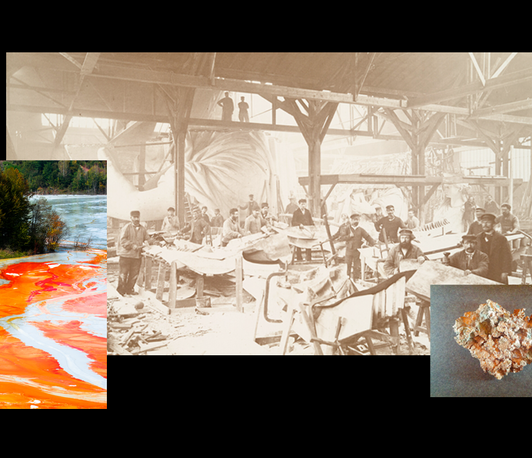Mining Conversations. The Futurepasts of ... Copper
The series is hosted by the Max Planck Institute of Geoanthropology and the Anthropocene Commons network.
- Date: Apr 29, 2025
- Time: 08:00 PM - 09:30 PM (Local Time Germany)
- Speaker: Gustave Lester, Centre for Anthropocene History, KTH Stockholm/ Victor Hugo Salinas Silva, Pontificia Universidad Católica de Valparaíso, Chile/ Jennifer Scappettone, University of Chicago
- Location: online
- Host: Max Planck Institute of Geoanthropology and Anthropocene Commons
- Contact: rossee@gea.mpg.de

Mining Conversations invites you to join its initial online session The Futurepasts of … Copper. It will be the start of a monthly online series to critically reflect and discuss extraction and energy landscapes, across geographies and temporalities—up to this moment in which resource regimes more than ever shape economic, societal and environmental realities planetarily and locally in very unequal ways.
About the Speakers
The following speakers will initiate the session with their short inputs:
Gustave Lester is an environmental historian and a historian of the earth and environmental sciences. He completed his doctoral program in the Department of the History of Science at Harvard University and is currently a postdoctoral researcher in the Centre for Anthropocene History at KTH Royal Institute of Technology in Stockholm. His research concerns the relationship between extractivism, geoscientific knowledge, and imperial political economies since the eighteenth century. In recent work, he examined the relationship between settler colonialism, geology, and the rise of mineral intensive industrial manufacturing in the nineteenth century United States, including how land expropriated from Anishinaabe nations in the Great Lakes Region of North America became one of the largest sources of copper for U.S. industrial capitalists. Gustave is now investigating the long history of “critical minerals” and empire in Anthropocene History.
Jennifer Scappettone works at the confluence of the literary, visual, and scholarly arts, and teaches in the faculties of English and Creative Writing, Romance Languages and Literatures, Comparative Literature, Gender and Sexuality Studies, and the Committee on Environment, Geography and Urbanization at the University of Chicago, where she founded the Environmental Humanities + Arts Lab (The City and its Others). She is the author of Killing the Moonlight: Modernism in Venice (Columbia University Press, 2014) and of the forthcoming Poetry After Barbarism: The Invention of Motherless Tongues and Resistance to Fascism (Columbia University Press, 2025). Her poetry collections include From Dame Quickly (Litmus, 2009) and The Republic of Exit 43: Outtakes & Scores from an Archaeology and Pop-Up Opera of the Corporate Dump (Atelos, 2016); her words have been installed at venues ranging from 6018North in Chicago to the Newhouse Center for Contemporary Art in New York City. Scappettone has collaborated with musicians, architects, and dancers to sound counter-histories of sites ranging from the tract of Trajan’s aqueduct beneath the Janiculum Hill to Michigan’s Quincy Copper Mine to Fresh Kills Landfill. Her current project devoted to the “copper lyre” subtending modern and contemporary communications networks, Pennies from Nether, was a finalist for the 2024 Creative Capital Award in Literature. Following a term as Visiting Professor at the Université Gustave Eiffel, she is currently curating a series of “floating workshops” devoted to the geopoetics of urban rivers comparing the fraught dynamic of water within the built environment in Paris with that of Chicago, the would-be “Paris on the Prairie.”
Victor Salinas-Silva is a professor at the Institute of Geography at PUCV, Chile. He is a researcher at the Center for Climate Action, and Director of PAR Explora Valparaíso. Victor has a degree as History and Geography teacher and has specialised in Geography, continuing his studies with an MSc in Environmental Studies from University College London and then a PhD in Geography from the UCL Institute of Education. His research focuses on the geographies of education, with an emphasis on rural communities in the context of climate change. His approach involves a triad of: 1) the territoriality as an epistemology of the South; 2) the social production of space, in particular, rural communities, as well as the living conditions of rural children; and 3) the management and spatial planning of education at the regional level.